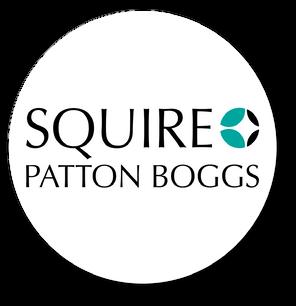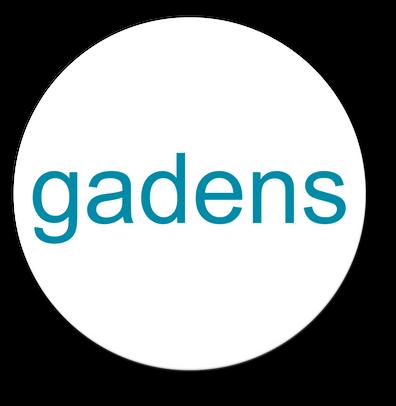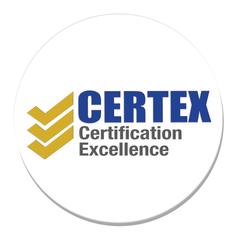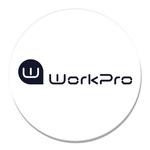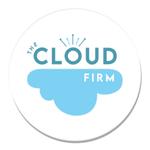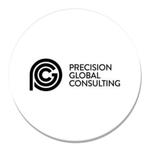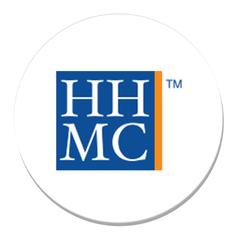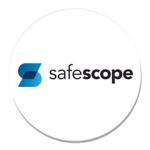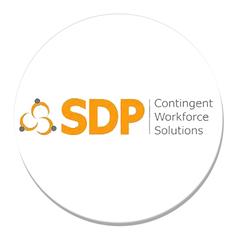





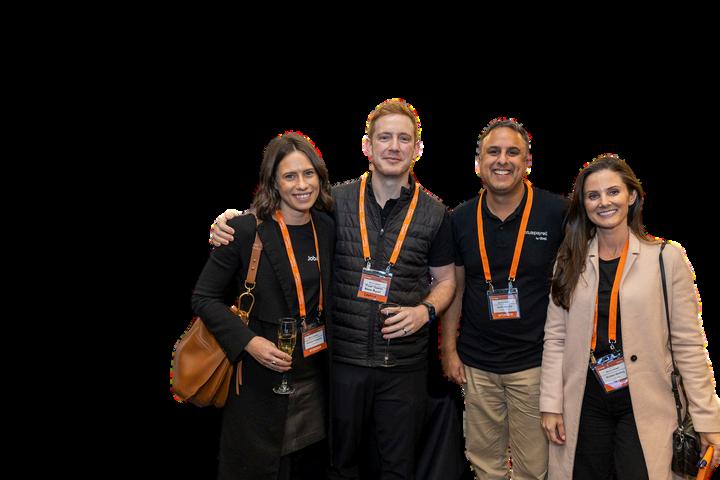


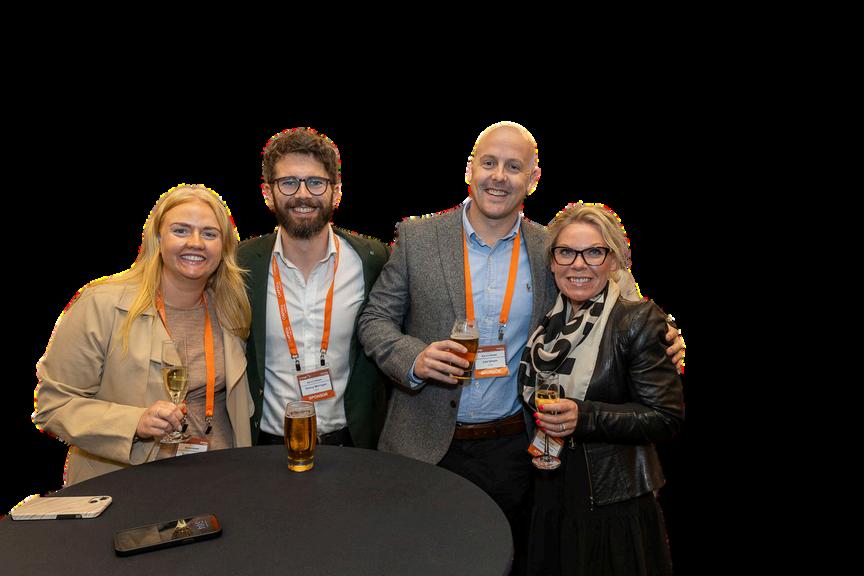






9:00AM

KEYNOTE PRESENTATION

A G E N D A A G E N D A
9:50AM

PANEL:FROMNOWTO NEXT

Unpacking the economic outlook with Sian Fenner
Our panel share how they envisage the future of work and how they’re showing up to participate in the future
11:00AM
12:00PM
1:20PM
2:00PM 3:10PM 3:50PM
KEYNOTE PRESENTATION
KEYNOTE PRESENTATION
PANEL:OPERATING THROUGHCHANGE
PANEL:UNLOCKINGTHE POWEROFCOMPLIANCE
LIVEEDITIONOF DEALMAKERS

Adapting to the Future of Work with Andrea Clarke, Work Futurist
Where to for the Recruitment Market? With Greg Savage
Ashortclosingsessiontoreviewthekeypointsofthe day
Our panel will share practical tips, real experience and offer tangible takeaways to help your business stay on track through times of change
Hear our panelists discuss the role that compliance plays in a commercial setting and how best to harness the opportunity
From podcast to the main stage! Emerge will host a special live edition of Deal Makers, where recruitment’s boldest conversations come to life in front of an audience

Ashortclosingsessiontoreviewthekeypointsofthe day
The Big Rec Quiz comes to the Emerge stage to test your industry smarts, competitive streak, and team spirit
Network with your recruitment peers and leaders

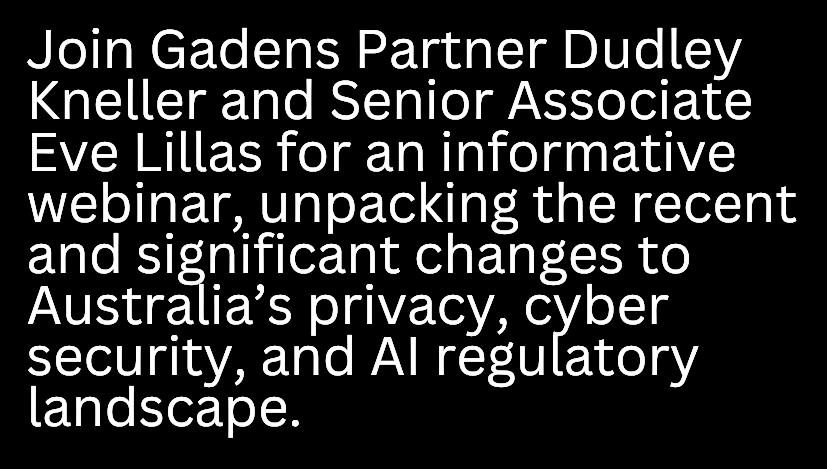






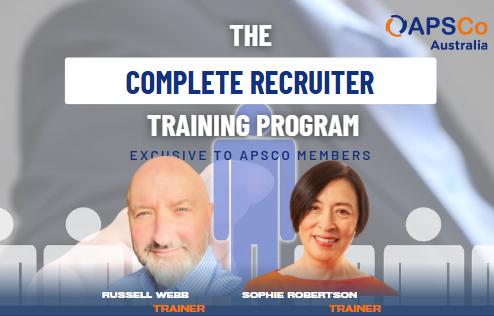









The Complete Recruiter has been specifically curated alongside 2 of the market’s well-known coaching and training faces: Sophie Robertson and Russell Webb.
APSCo members enjoy team-wide access—no need to spend thousands per recruiter.
1.How to be successful in the recruitment industry
2 Building your market through candidates
3.Introduction to business development
4.Relationship building with clients
5.Taking an effective job brief
6.Managing the temp process
7.Managing the perm process
8.Keeping the business on your terms
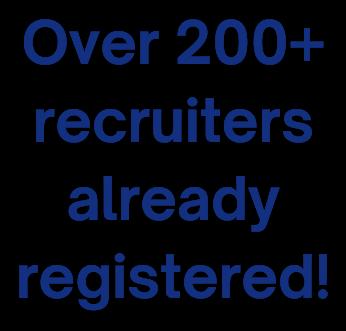


We are pleased to announce the appointment of four new Directors to the APSCo Australia National Board, following the member vote. The new Directors bring a diverse mix of legal, operational, strategic and industry expertise to the Board, strengthening our ability to advocate for members and support the future of professional staffing across Australia.

Ellen Nelson General Counsel, ManpowerGroup
Russell Webb Director, Claverdon Consulting

Christine Wright CEO, Bluefin Resources

Kay Eriksson ng Officer, Whizdom


It’s conference time again. In the lead up t year, part of my content planning is to tak evaluate how the market feels, what memb communicating and what signals are surfa indicate change ahead. It’s part fact findin forecasting and is one of the highlights of

This year feels different. The signals are popping from Members and the broader market is one of c times then AI is set to usher in a transformation th permanent.
Add to that the backdrop of global economic uncertainty, rising operating expenditure, complex regulation and compliance, margin pressure and underperforming teams, and there has never felt like more need for a shift in how we see our value than now.
Emerge 2025 will tackle the technological revolution we are all experiencing and combine the stories of how recruitment firms are using this time of transformation to diversify, create value and ensure their businesses stay relevant
From steering the P&L through times of change, leveraging legal and compliance hurdles to gain commercial outcomes and understanding where your focus is best directed, this is going to be a day that I think that we will all remember.
We’ve got some of the most reputable names in the market lined up and I cannot wait to see you all there!
APSCo Australia Managing Director LESLEY HORSBURGH

With Labor securing another term in governmen following the recent federal election, recruitmen across Australia are now preparing for a new wa industrial reforms that could significantly reshap we operate.

Steve Smith Founder and Managing Director, Sirius People APSCo
Australia Chair
From workplace law changes and wage protections to award mod Albanese government is doubling down on its commitment to bu landscape. And while that creates complexity in some areas, it also unlocks opportunities, particularly for agencies that can adapt early and offer real value to clients navigating change.
One of the headline reforms now set to become law is the banning of non-compete clauses for workers earning under $175,000 a year (excluding super) For years, these clauses have been a staple in our industry, offering agencies and clients a way to protect intellectual property, commercial relationships, and candidate exclusivity
That’s about to change Under Labor’s policy, these clauses will be unenforceable for the vast majority of candidates we place Agencies will need to reframe how they manage risk and retain talent Building strong relationships, offering career progression, and aligning values will be more important than ever. It’s a wake-up call to shift away from legalistic protection models toward trust-based, high-value partnerships with both clients and candidates.
Labor has confirmed it will lock in protections for penalty rates, preventing employers from offering higher base pay in exchange for reduced entitlements This is particularly relevant for agencies operating in healthcare, retail, and hospitality, where such trade-offs have historically been common We’ll need to carefully review pay structures and ensure that bundled rates continue to meet award compliance For clients, it may mean revisiting their expectations on flexibility and cost and for agencies, it's a chance to play a more advisory role in helping navigate compliant solutions.
Another positive for our industry is the government’s renewed focus on the community and disability sectors, with funding allocated to modernise the SCHADS Award and improve career pathways. This could see increased demand for quality candidates and stronger retention across the sector provided we can support employers in understanding the new classifications and pay structures
As someone who recruits in this space, I see this as a genuine opportunity Agencies that specialise in care work, or are looking to enter the sector, should position themselves early to ride this wave of change
Labor’s ‘Same Job, Same Pay’ law will remain a key feature of the industrial landscape, ensuring labour-hire workers are paid the same as their permanent counterparts. This is a significant shift in how agencies negotiate rates and build proposals.
It introduces a level of complexity particularly around award interpretation but it also creates a clear mandate for professionalism and transparency Agencies that can demonstrate compliance and educate clients on their obligations will be well positioned to maintain long-term partnerships
The government has signalled its intention to review definitions of casual work and contractor arrangements, pushing towards more secure forms of employment. For the recruitment sector, that means tighter scrutiny and a higher compliance bar when it comes to classification, rostering, and documentation.
We should view this not as a threat, but as a call to lift standards Casual and contract work will always have a place in the economy, but the expectation is shifting Workers want flexibility and fairness Agencies that can offer both will continue to thrive
Labor’s return to government is not without challenges for our sector. Yes, it will mean more regulation. Yes, it will place new demands on how we structure agreements and contracts. But it also provides an opportunity for our industry to lead.
We’re being asked to do more than just fill jobs. We’re being asked to advise, to educate, and to raise the bar.
Whether it’s helping a healthcare provider navigate new penalty rate rules, guiding a tech startup through the end of non-compete clauses, or working with NDIS providers on SCHADS Award updates, recruitment agencies have the chance to be part of the solution
This election result confirms the direction of travel: toward greater protections for workers and more accountability for employers and intermediaries. It’s a cultural shift as much as a legislative one. The most successful agencies over the next few years will be those that embrace this shift, invest in compliance and advisory capability, and commit to delivering value beyond placements.
At APSCo, we’ll continue working closely with government and regulators to ensure the voice of professional staffing firms is heard, and that agencies have the tools and support they need to adapt and succeed
If ever there was a time to lead from the front, this is it
Director, Sirius People, APSCo Australia Chair

The recruitment industry is at a turning point AI and automation have moved beyond buzzwords to become essential tools for efficiency and success At TargetRecruit, we’ve been tracking these shifts closely, and our Recruitment Tech Trends for 2025 report (published earlier this year) confirms what we’ve long anticipated. AI agents are no longer optional – they’re indispensable.

In our latest report, we identified AI Agents as the defining technology of 2025 These intelligent assistants are set to revolutionise the industry by automating time-consuming tasks, optimising decision making, and enhancing recruiter productivity The ability to analyse candidate data, manage communications and provide real-time insights means recruiters can spend more time on what really matters – building relationships and making strategic hires.
Recruiters today face mounting pressure to identify top talent quickly while maintaining high engagement levels. The manual workload – reviewing CVs, scheduling interviews and sending follow-ups – often slows down the hiring process. AI Agents are the solution, acting as digital assistants that take care of repetitive tasks, freeing recruiters to focus on high-value activities.
Our AI Agents, powered by Agentforce, is designed to address these challenges head on. It automatically shortlists candidates, schedules interviews, and enhances candidate interactions with personalised, automated communication. It doesn’t just work for recruiters, it works with them, enabling a smarter, faster and more data-driven approach to hiring.
The integration of AI Agents in recruitment isn’t just an innovation It’s a necessity Firms that embrace AI early will gain a competitive edge, delivering better hiring outcomes while optimising efficiency With AI Agents, recruiters can finally shift their focus from administrative tasks to strategic decision-making
The future of hiring is intelligent. And it starts now. https://au.targetrecruit.com/tr-intelligence-recruitment-ai/

New data from Westpac has revealed that one-third (38%) of businesses identify cash flow issues as one of their biggest operational challenges with 45% reporting lost time chasing late payments[1].
Westpac has announced the launch of a digital invoice finance solution powered by FinTech, Dancerace. By integrating directly with cloud-based accounting software, the offering can cut the application submission time in half[2].
“The days of businesses emailing spreadsheets back and forth are over. We’re removing some of the main barriers that have historically prevented businesses from accessing working capital when they need it most, ” said Tamara Bryden, Westpac Managing Director, Business Lending
“Our invoice finance solution allows businesses to turn their unpaid invoices into near instant cashflow The self-service portal is available 24/7 and our real time drawdown means that once approved you can access funds within minutes freeing up cash that businesses can put to work right away, ” said Tamara Bryden.
The survey data also revealed just over one in ten (11%) businesses wait 1-2 months to receive payment on invoices with larger businesses waiting longer than smaller businesses on average As a result, a third (34%) of businesses experience direct cash flow problems with delayed payments to their own suppliers (27%) and the inability to pay staff (11%)
“We’re not just offering finance, we’re giving business owners their time back, while helping to solve one of their most pressing cash challenges, ” said Tamara Bryden.
The data shows that invoice finance would be a more accessible solution for many businesses if it was integrated with their accounting software (83%) While those who have used invoice finance believe the process would improve if it included a digital application system (45%) and a 24/7 selfservice portal (42%)
“The good news is that’s exactly what’s on offer with our new invoice finance solution There are significant opportunities for us to help customers manage their cashflow more efficiently, ” said Tamara Bryden.
“You don’t need a property to secure invoice finance so if you’ve got a good business but you’re renting and need a cash flow injection, this is a good way to go, ” said Gary Coutsoudis, founder of Global Trade Logistics.
For more information on Westpac’s invoice finance solution please visit: Invoice finance | Westpac
[1] The research was commissioned by Westpac and conducted by Lonergan Research in accordance with the ISO 20252 standard Lonergan Research surveyed 501 Australian Business leaders 18+ with surveys distributed throughout Australia including both capital city and non-capital city areas The survey was conducted online amongst members of a permission based panel, between Wednesday 26th of February and Tuesday 11th of March 2025. After interviewing, data was weighted to the latest population estimates sourced from the Australian Bureau of Statistics
[2] Eligibility and credit criteria, Terms & Conditions, fees & charges apply
Global Trade Logistics (GTL) is a family-owned business specialising in the transportation of diverse goods across Australia, Asia, Europe, and the US They use invoice finance to help their business grow rapidly “With invoice finance, we get 85% of the invoice upfront, freeing up cash we can put back into the business. So, if we have a client with a $70,000 invoice, we can access $59,500 immediately. "
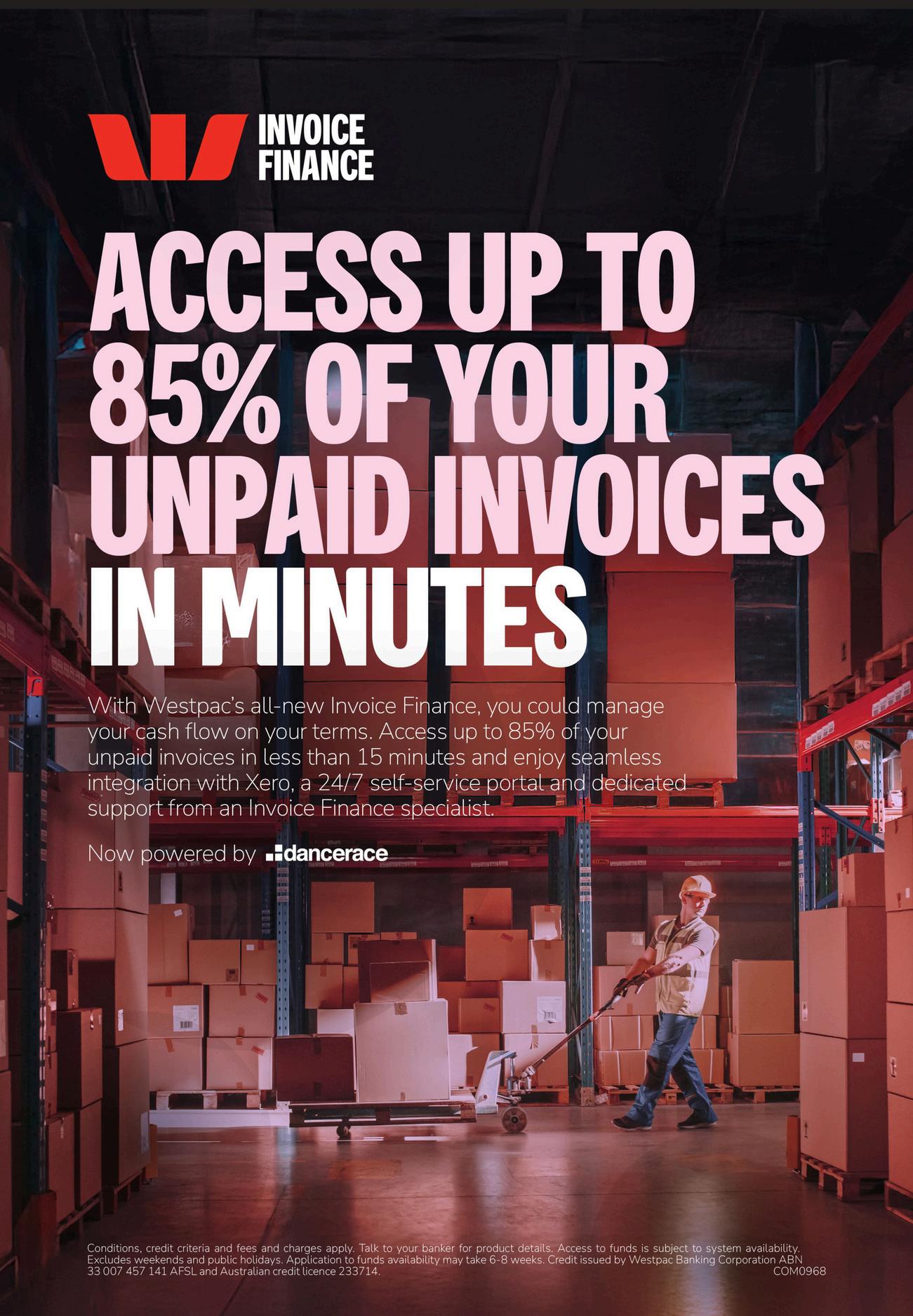

In my role of Managing Director at Talent, I often get asked by both clients and candidates what is happening in the SA market. Below are some of the trends and insights that I’m happy to share with you.

Anthony Whyte MD, Talent International APSCo Director
Economic Performance: South Australia has demonstrated solid economic momentum over the past year, with strong GSP growth and recognition as the top-performing state economy in CommSec’s national rankings While growth is projected to moderate in 2024–25, long-term forecasts remain steady
Employment Trends: Employment growth is softening from 3% to 0 75% yet unemployment remains low A stable labour market is supported by steady population growth, forecast at around 1 3% annually over the next two years
Housing Market: The housing sector continues to drive economic activity Adelaide led the nation in long-term house price growth, up 175% since 2005 Limited supply only 9,700 dwellings commenced in 2024 has intensified demand The Better Housing Future Plan aims to alleviate this by adding 40,000 new houses
Business Conditions: While sectors like construction and tech are stable, the hospitality sector is under pressure Over 10% of businesses in the sector closed in the past year, largely due to cost challenges and waning consumer spending
Trade and Exports: Agriculture remains a key export pillar, but is facing international trade headwinds, particularly from emerging U S tariffs on products like beef and wine Strategic Investments: Future-focused investments are underway, including a $1 billion green iron fund and expanded digital infrastructure like a $100 million data centre These initiatives aim to future-proof South Australia's economy and promote sustainable industry growth
Tourism and Connectivity: The return of direct international flights, such as Cathay Pacific’s Adelaide–Hong Kong route, is expected to inject $32 million annually into the state economy, boosting both tourism and trade
In summary, South Australia's market outlook is mixed but resilient anchored by strong fundamentals, challenged by sectoral headwinds, and supported by targeted investments in infrastructure, housing, and sustainability.

As another challenging financial year draws to a close, many in the recruitment industry are turning their attention toward the year ahead one we hope will bring renewed opportunity. This is a time for reflection, goal-setting, and identifying how we can continue to deliver value for our clients and candidates, all while laying the groundwork for sustainable growth.

Director, Claverdon Consulting APSCo Director
One of the most time-consuming yet crucial aspects of annual planning is deciding how to grow headcount.
How many people should we hire?
Which markets or sectors should we enter or further invest in?
Where will we find the right talent?
What do we have to offer? What is our EVP?
What methods and resources will we use to identify and engage with potential hires? What is our ideal budget?
In recent years, many firms have had to reduce headcount to rebalance costs, improve productivity, and ultimately survive in a volatile market. Interestingly, this has led to more being achieved with fewer consultants resulting in increased engagement, performance, and loyalty. But can that model sustain itself long-term as the market (hopefully) begins to rebound? Over the next 12 months, we’re seeing increasing interest in headcount growth, particularly focused on experienced recruiters. But basic supply-and-demand economics tell us that if everyone is hiring from the same pool, competition will intensify and saturation may already be near.
So what are the options?
Develop a compelling EVP that appeals to the top 5% of passive candidates?
Offer stronger financial incentives to attract high performers?
Reinvest in the rookie market and nurture the next generation of resilient, sales-driven talent?
If we go down the latter route, we must ask: What does our onboarding, induction and training program experience look like? Do we have the internal resources and external partners to support new starters?
The opportunity lies in asking not “can we?” but “how can we?” Let’s approach 2025 with optimism, intentionality, and the belief that we can build successful, future-ready teams—even in uncertain times

We entered the APSCo Awards and it was a gamechanger
We entered the APSCo Awards and it was a gamechanger
In 2024, Cornerstone Medical Recruitment took home two APSCo Australia Awards for Excellence - one for Best Brand, and another for their standout Learning & Development program.
While they won’t be entering in 2025, their success story offers valuable inspiration for those thinking about nominating this year.
We sat down with the Cornerstone team to reflect on what the wins meant for their business, how they approached the process, and why entering the APSCo Awards was a game-changer.
1. Congratulations on Cornerstone’s incredible success in the 2024 APSCo Awards for Excellence! Let’s start with your Best Brand win — what does brand mean to your business, and what do you think set your entry apart?
Brand, for us, is what people say about you when you’re not in the room. It’s how your community feels about you and that emotional connection matters, especially in healthcare
We’ve always believed that our brand needs to reflect not just our passion for what we do, but also the vital, life-changing work our community does every day. It’s not easy building a brand that resonates across three very different audiences our internal team of local recruiters, our clients, and a national healthcare workforce

But we’re intentional with every move we make. From our employer brand to our marketing, podcast, and charity work, we’ve never taken our reputation for granted We’ve always invested in it because we know a strong, authentic brand is how you build trust, grow community, and ultimately make a bigger impact.
2. Your Learning & Development award highlighted a strong commitment to nurturing talent — what inspired the approach you took, and how has it impacted team performance or engagement?
L&D has been part of our foundation since day one. Way back in 2012 when we launched cmr, we could not attract experienced recruiters because we didn’t have the reputation (or the money!)
We had to find great people who had transferrable skills that we could nurture and develop and help to grow their career in recruitment Our first ever hire is still with us today!
3. Many businesses shy away from entering awards, but you clearly embraced the opportunity. What motivated Cornerstone to put forward these entries in 2024?
Our Brand and L&D have been key focus areas for us in recent years We were very proud of the improvements we had made, and the awards were a great opportunity for us to get some feedback and recognise the hard work and dedication of the team. We also put forward these entries as they celebrated traditional back office teams, being marketing and L&D Two teams we have always been super passionate about and feel are critical to the success of any agency.
4. What advice would you give to other recruitment businesses considering entering the 2025 APSCo Awards for Excellence for the first time?
Do it. It’s such a valuable process (even if you don’t win!). We have learnt more from the awards we did not win You’ll spot gaps you didn’t know were there and uncover opportunities to do things better The feedback from the judges is invaluable Best of all, it gives your team a real moment to come together, reflect, and be proud of what you’ve achieved (even if you don’t win!)
5. Although Cornerstone won’t be entering again this year, how has the recognition from your 2024 wins continued to benefit your brand and your people?
The recognition from last year is so valuable. I truly believe it helps to open more doorsbringing in new clients and candidates and of course attracting and retaining our internal team Ultimately this means we get to help more people and make a bigger impact in the healthcare space. And that’s what we’re all about.
6. If you had to sum up your APSCo Awards experience in one word — what would it be?
Valuable! I love the APSCO Awards experience! You get good feedback. The award submission process is easy and the questions are well considered. It’s a great awards night which has a great vibe and is a fantastic way to celebrate your people, and your progress

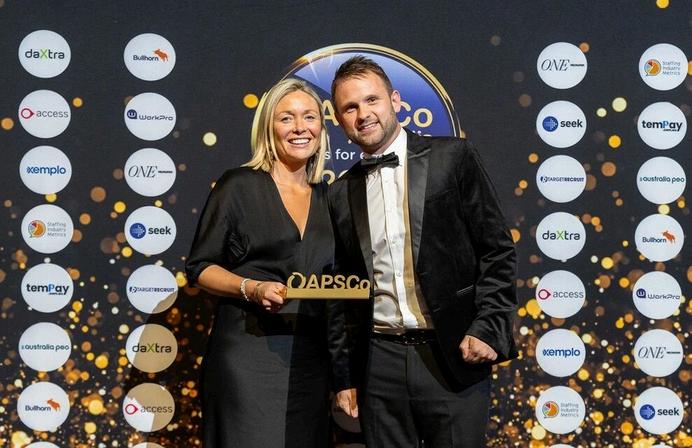



At this year’s Engage Boston, Bullhorn unveiled something that felt genuinely transformative: Amplify, a next-generation AI solution built specifically for recruitment.
In an industry where growth has long meant hiring more people to keep up, Amplify offers something radically different a way to scale without increasing headcount.
In just the past year, Bullhorn’s generative AI tools have been used over 100 million times a clear signal that the industry is ready for change. Now, with Amplify, Bullhorn introduces a fully integrated suite of AI skills that operate like your best recruiter.
It helps automate and speed up hiring, improving every step of the recruitment journey It can fill roles in an instant and scale messages while keeping them personal
And it fits right into the tools recruiters already use so teams can work faster and smarter, with fewer hurdles.
The implications are profound. Where growth once meant burnout and bandwidth always had limits, Amplify introduces a new model one where junior talent rises faster, seasoned recruiters operate at peak performance, and the daily grind is almost completely lifted.

Importantly, Amplify enhances, rather than replaces, the human side of recruitment.
It handles all the rote, repetitive tasks so recruiters have more time for the more human parts of the job that can’t be automated: connecting more deeply, listening more closely and closing more deals.
At agencies like IDR, Amplify is already transforming entire processes. Junior recruiters ramp 30% faster Senior ones double their output
By integrating AI directly into their system, they’re screening 15,000 more candidates a month and placing them faster, with stronger matches In short, they’re doing more with less and doing it better.
“Amplify has transformed how we recruit," said Will Hayes, COO of IDR,
“As our confidence grew, we embedded Amplify into our broader automation strategy, and that's when the ROI really accelerated.
AI has woven into every step of our workflow and has become a true game-changer for the business. "”
Designed with recruiters in mind, Amplify brings focus, speed, and intelligence to every step of the process.
It helps teams connect with more candidates, fill more roles, and grow in ways that feel smart, sustainable, and aligned with how recruiters actually work
The future of recruitment is no longer some distant, far-fetched vision. It’s already here and it starts with Amplify.

In today's fast-paced recruitment landscape, efficiency and personalization are key. LinkedIn introduces the Hiring Assistant, an AI-driven tool designed to streamline your hiring process, allowing you to focus on the most impactful aspects of recruitment.
The Hiring Assistant seamlessly integrates with LinkedIn Recruiter and Jobs, taking on time-consuming tasks such as: Building pipelines of qualified candidates based on your hiring goals
Drafting outreach messages to potential applicants
Answering basic questions about the role
Managing administrative duties like interview scheduling, meeting notes, and follow-ups
By handling these tasks, the Hiring Assistant enables you to dedicate more time to creating exceptional candidate experiences and engaging with hiring managers.
You maintain full control over the recruitment process. The Hiring Assistant provides guidance on sourcing strategies, learns from your feedback, and shares proactive updates.
You choose where you want assistance, ensuring that the tool supports your unique hiring needs.
Early adopters have reported significant improvements: At Siemens, senior talent acquisition partners reduced their sourcing time by 50%, allowing them to focus on more critical tasks
A Senior Strategic Sourcing Lead at Equinix doubled the number of roles supported by leveraging the Hiring Assistant for roles with fluctuating staffing needs.
Join the Future of Hiring

Currently in its charter phase, the Hiring Assistant is available to LinkedIn Recruiter and Jobs customers.
Sign up to receive updates and resources to get started with this innovative AI-powered tool
Stay in the know: Sign Up for Hiring Assistant Updates
Embrace the future of recruitment and enhance your hiring efficiency today

Australia’s staffing and recruitment sector continues to impress –with $46 billion in revenue recorded for 2023, it is now the second-largest market in the Asia-Pacific region, trailing only Japan. This puts Australia ahead of larger economies like China, and several Southeast Asian nations combined. Yet, despite the sector’s scale, recent years have brought significant fluctuations to the M&A environment.
Paul Masters Managing Director, Sovereign Private
Coming out of the pandemic, 2022 saw a boom in transactions. At Sovereign Private, we advised on four high-profile sales including Finite Group to Randstad and Launch Recruitment to Japanese acquirer Geechs
This momentum, however, did not carry forward. By 2024 and into 2025, deal activity slowed sharply not because of a lack of buyers, but due to reduced agency performance, which has impacted valuations
Many owners are unwilling to sell at today’s lower earnings and multiples, especially when reflecting on the high benchmarks set in by FY2022 financials.
Despite current caution among sellers, interest from buyers remains robust
Japanese firms, particularly second-tier players outside the likes of Recruit and Persol, continue to see Australia as an ideal first step for international expansion – driven by strong governance, market size, and cultural affinity
European interest, especially from the UK, is also returning after a hiatus sparked by geopolitical instability. To achieve a standout transaction in this environment, business owners must focus on three critical elements First, identifying a strategic buyer – one who sees the acquisition as essential to their growth strategy –maximises valuation.

As confidence begins to creep back into the market, we are seeing early signs of deal flow, particularly in cyclically resilient sectors like healthcare and life sciences
A full recovery will depend on improved financial results, particularly in technology and white-collar sectors, where business confidence remains subdued.
At Sovereign Private, we remain deeply committed to helping agency owners navigate these complexities
Second, businesses must be exitready: clean financials, compliance, and governance are nonnegotiable Third, mitigating risk areas such as client concentration and weak management succession is vital
Through our new monthly APSCo Dealmakers podcast, we’ll continue sharing insights, case studies, and strategies to support successful outcomes in recruitment M&A

Following the re-election of the Albanese Labor Government, employers should prepare for further industrial relations reforms aimed at strengthening employee and union protections Key changes will impact labour hire practices, superannuation, postemployment restraints, and regulatory oversight, with the reforms benefiting a broad range of Australian workers
The Fair Work Legislation (Closing Loopholes) Act 2023 introduced “same job, same pay”, effective from November 2024. Despite the Liberal party mooting the possible repeal of the ‘same job same pay’ reforms, the Labor Government will continue to employ the legislation
Under the legislation, labour hire workers must receive the same remuneration as directly engaged employees for equivalent work. Major companies such as Qantas and BHP have already faced significant financial and administrative impacts
Employers are urged to review labour hire contracts and workforce structures to ensure compliance.
From 1 July 2026, employers must pay superannuation contributions on the same day wages are paid, replacing the current quarterly schedule. This reform, “payday super,” is intended to address unpaid super and benefit lowerincome and casual employees
Employers should ensure their internal processes are prepared for this transition to avoid potential compliance issues.
The Federal Government has reaffirmed its intention to implement a national labour hire licensing regime, streamlining existing regulatory frameworks currently governed at the state and territory level.




The scheme will aim to protect vulnerable workers, enhance enforcement of workplace laws, and reduce duplication for businesses operating in multiple jurisdictions.
Major reforms proposed for 2027 will prohibit non-compete clauses in employment contracts for employees earning below the high-income threshold (currently $175,000 and increased annually). Employers found in breach could face civil penalties.
The changes are likely to affect professions in sales, IT, legal, and financial services Non-solicitation and non-poaching clauses may also be impacted, subject to consultation. Employers should begin reviewing restraint provisions as soon as possible.
A continued cultural shift is expected in the Fair Work Commission, with more appointees from union or employee advocacy backgrounds.
This may influence outcomes in areas like enterprise bargaining, unfair dismissal and labour hire regulation.
To prepare, businesses should monitor labour hire arrangements, update payroll systems ahead of payday super changes, and review contract terms related to postemployment obligations
For more detail on these upcoming employment and industrial relations reforms, click here.



Selling your recruitment business is a pivotal moment that defines your financial future and professional legacy. Unlike placing a candidate, which is quick and tactical, selling a business is strategic, long-term, and involves multiple stakeholders buyers, lawyers, funders, and advisers.
Chris Slack, from The Finance Consultancy writes.
You're not facilitating the deal.
You are the deal.
Many owners turn straight to private equity (PE), but focusing only on equity can mean losing control, culture, and long-term value A smart exit requires understanding both equity and debt options and having a specialist adviser to guide you.
Selling a Candidate vs. Selling a Business
Candidate placements are shortterm and fully in your hands A business sale? It’s complex, requires funding strategy, and must appeal to multiple parties You’ll need to evaluate options like trade sales, PE, management buyouts (MBOs), or employee share ownership plans (ESOPs) each with different funding implications.
Optimising working capital can boost your valuation and reduce deal risks. Smart solutions like invoice financing or flexible credit lines help you:
Smooth cash flow and reduce overdraft reliance
Strengthen your balance sheet
Prove financial discipline to buyers
Avoid last-minute liquidity surprises
Debt Funding
Retain full control and ownership
Suitable for profitable, cashflow positive firms
No equity dilution or outside influence Equity Funding
Brings in capital but dilutes your ownership
Involves external input and potential cultural shifts
Can enable growth but changes your role
A specialist adviser helps assess your goals and risk tolerance, models the outcomes, and structures a deal tailored to your situation
Recruitment-focused PE firms that apply cookie-cutter strategies may minimise the pool of potential buyers.

Chris Slack Director, The Finance Consultancy
Foreign buyers offering inflated multiples with hidden risks.
Generic brokers who market your sale without tailoring your exit plan
The Value of a Specialist Adviser?
Explores all funding options not just equity
Connects you to trusted funders
Negotiates terms that protect your future
Prepares your business to attract the best buyers
Debt keeps you in control, speeds the process, and preserves your upside
Combined with strong working capital strategies, it can lead to a cleaner, more rewarding exit.
Don’t just take the deal make the right one With the right guidance, you’ll walk away with more than just a number you’ll preserve your culture, your control, and your legacy

The past few years have been some of the most dynamic yet for the staffing industry. While challenges remain, there’s a growing sense of optimism and signs that the second half of 2025 will be easier to navigate. Astute Payroll writes.
In conversations with clients at exhibitions and meetups this year, a clear shift has emerged: rather than taking a panicked, scattergun approach, agencies are increasingly focusing on the sectors and opportunities where they can offer unique value
Despite the headlines about technology and AI transforming everything (and threatening our jobs), the reality on the ground is more nuanced. Challenges persist - especially when pivoting across more complex sectors like healthcare and construction
That’s why the expertise of experienced consultants, supported by a well-configured and robust middle office system, remains essential.
We’re also seeing a trend where clients spend considerable time assessing the growing number of bolt-on solutions available But often, the best return on investment comes from optimising the platforms you already have and keeping it simple where you can.
Prioritise system configuration and, critically, ensure your payroll team is well-trained and supported - they are the key to staying safe and compliant

Astute has come a long way over the past 15+ years - from being one of just two primary “off-theshelf” solutions to operating in a much more competitive and innovative market.
Since being acquired by Deel Inc. in 2022, we’ve become part of one of the fastest-growing tech company in history. Deel’s ongoing challenge and mantrakeep things simple - is far from easy, especially in the complex world of global payroll
The real question remains: how many different systems do you need to make a placement, track time, process payroll compliantly, invoice efficiently, and gain realtime insight into margins and costs?
And more importantly - how many systems do you actually want to be paying for?
The key challenge now for agencies is to invest time in the review stage: understand your business deeply - how it operates, where the real vs perceived limitations lie - and run a strong business analysis before engaging new providers
Once you’re clear on your full list of requirements (even the small ones), you’ll be far better equipped to identify what really matters - and what doesn’t. In today’s purchasing decisions, nothing should be left to assumption.

The Queensland Government has introduced changes to its Work Health and Safety Act 2011 through the Work Health and Safety (Sexual Harassment) Amendment Regulation 2024. This amendment strengthens regulations to address risks of sexual harassment and sex or gender-based harassment at work, requiring Persons Conducting Business or Undertaking (PCBUs) to specifically manage them. Certex writes.
What has changed?
From 1 September 2024, PCBUs are required to proactively take action to minimise or mitigate the risks of sexual harassment and sex or gender-based harassment at work
From March 2025, PCBUs are required to prepare prevention plans on identified risks related to sexual harassment and sex or gender-based harassment at work.
Source: WorkSafe QLD
What should I do?
PCBUs are required to follow the risk management process to identify and assess risks related to sexual harassment and sex or gender-based harassment in the workplace. Refer to the guide published by WorkSafe QLD for more information
Who are at more risk of experiencing sexual harassment and sex or gender-based harassment?

Anyone can be at risk, but WorkSafe QLD has identified a few groups of individuals who are at higher risk, such as:
Female workers in workplaces where most workers are males
Workers who are new to the workplace
LGBTIQA+ workers
Aboriginal and Torres Strait
Islander workers
Workers with a disability
Workers who are younger than 30 years
Migrant workers
Workers on temporary visas
Workers from multicultural backgrounds
Workers in insecure working arrangements such as casual workers and labour hire workers
When should I prepare a prevention plan?
PCBUs are now required to prepare and implement a prevention plan in instances where a sexual harassment and sex or gender-based harassment risk has been identified, and control measures are required to mitigate or eliminate that risk
Accordingly, prevention action must be taken before any form of harassment takes place instead of managing it once it occurs or a complaint of a harassment is received Source: WorkSafe QLD
What should prevention plans include?
WorkSafe QLD has compiled a guide for PCBUs to follow when creating their prevention plans
According to it, prevention plans:
Must be in writing
Must state each risk that has been identified
Must state the control measures that were implemented or are planned to be implemented to mitigate or eliminate each risk that was identified Must state the matters that were taken into consideration when choosing the control measures
Describe the process of consultation undertaken
Must state the procedures that will be in place to deal with incidents related to sexual harassment and sex or gender-based harassment at work
Must be compiled in a way that is easily accessible and understandable to workers
For more information and a template for creating prevention plans visit the WorkSafe QLD website


Australia’s job market is filled with capable individuals ready to contribute. Yet many job seekers are being overlooked because of entrenched and outdated hiring practices, not a lack of skills. This is the core insight from WorkPro’s recent whitepaper, “Challenging the Unspoken Hiring Practices in Australia,” based on a survey of over 2,000 job seekers.
The findings paint a clear picture of widespread frustration Only 13.1% of new arrivals said their experience was recognised and they were considered for relevant roles.
Even among Australian-born candidates, 42 2% reported that their qualifications were not acknowledged for roles they were clearly suited for
Meanwhile, 37.7% said their transferable skills were dismissed, and 40.3% were told they were overqualified.
Most concerning, over 50% of Australian-born job seekers said they received no feedback after applying
These figures challenge the assumption that hiring in Australia is purely merit-based. Instead, they reveal a process heavily influenced by perception, familiarity, and ‘local experience’, a concept 38 4% of Australianborn candidates still struggle with, despite being native to the market.

This data highlights a critical issue: current hiring models often fail to recognise and act on available talent, despite the depth of skills in the market.
Whether it’s due to outdated screening tools, overly rigid job criteria, or a reliance on networks and internal referrals, many employers are unintentionally closing the door on qualified individuals WorkPro’s platform is designed to help businesses move past these roadblocks.
By centralising background checks, credentials management, eLearning, and compliance monitoring, we help employers streamline their processes and focus on what really matters -
identifying and supporting the right person for the job.
Our whitepaper offers practical strategies to address these barriers and create a more inclusive, transparent, and effective hiring environment If you’re ready to challenge outdated norms and build a workforce based on skill and potential, this resource is your blueprint.
Download the whitepaper and contact WorkPro today to take the first step toward smarter, more inclusive hiring

Workers Compensation is a complex area of insurance. Here are the top questions our Team gets asked the most. Safe Scope writes.
1. Q: Why should I work with a Safe Scope consultant?
A: Our consultants have over 150 years combined industry experience. We understand how to drive results for our clients in this space & acknowledging all stakeholders have a role to play in achieving a positive influence on claims management
2. Q: What kind of results can I expect to see when using a consultant?
A: We have assisted our clients to reduce their premiums over time, influenced by our consultants working closely with you & your business to understand existing claims & drive them to positive outcomes. We liaise with all stakeholders, creating return to work plans & closely managing third party providers.
3. Q: What sets Safe Scope apart from your competitors?
A: Safe Scope has a hands-on approach & work with all our stakeholders to ensure all parties are focused on achieving the right outcome.
4. Q: Are Insurers supportive of consultants assisting with claims management?
A: Yes, understanding that we are working with them to achieve the right outcomes for both parties Our ethic is to work in a transparent & collaborative manner with all stakeholders
5. Q: What is a reason a claim could be accepted when the claimant is under performance management?
A: Claims that are accepted generally occur when the organisation does not have a performance management procedure in place or cannot demonstrate that the procedure has been followed.
It is critical that you as the employer demonstrate you have acted in a reasonable manner when dealing with the performance issue and organisations that can validate this have a greater chance of claims being rejected related to performance.
6. Q: Who is the best Authorised Agent / Scheme Agent / Insurer?
A: We have great relationships with Authorised Agent / Scheme Agent / Insurers, built by the Safe Scope Team over the years We have dedicated teams at each who look after Safe Scope clients which assists in ensuring we get actions completed.
7. Q: Can I move Scheme / Authorised Agents?
A: Each state will have rules around transferring between Scheme / Authorised Agents
Our philosophy is to work with the current Agent wherever possible to improve performance. If this is not possible, we may consider recommending a change to a new Agent.
Any recommendation to change would always be done in consultation with you & the decision to change Agents is wholly the clients.
8. Q: Who is responsible for safety in the workplace?
A: Everybody is responsible for safety in the workplace. As an employer, we need to encourage & allow our people to speak openly about safety & most importantly any improvements required Safety should be the first agenda item in every meeting & businesses who actively promote such initiatives achieve better employee engagement.
9. Q: How can I ensure my workplace is safe at all times?
A: Your OHS / WHS team needs to implement a safety management program that addresses all areas of the business.
We also recommend an independent provider to perform an annual check to identify any gaps for improvement
10. Q: Can you provide me with a quote on all my insurances?
A: Safe Scope are part of Insurance House, a general insurance brokerage. Insurance House can assist in providing insurance solutions for all your business needs.
If you have any further questions or need any assistance, please contact Safe Scope via email info@safescope.au or 1300 776 327. We are here to help.





Recruitment business development is at a crossroads. 63% of agencies plan to increase investment in BD this year, but only 5% are happy with their current strategy. As markets shift, tech evolves, and client expectations grow, agencies must rethink how they approach growth. The future of BD will look very different to the past. JobAdder explains.
Here are three trends shaping what’s next:
1. Tech will empower, not replace, human connection
Digital tools like CRMs, automation, and AI are making BD faster and smarter. But surprisingly, phone calls remain the most effective BD tool, with 41% of recruiters rating them #1, nearly double the effectiveness of LinkedIn (21%)
It’s not either/or The most successful agencies combine automation with real conversations. They work smarter and stay personal.
2. Gaps in BD strategy will separate leaders from the rest
JobAdder’s Benchmarking Report shows while BD investment is high, clarity is lacking. When asked how they shape their BD strategy, 30% simply said, “investment in BD,” while far fewer cited structured approaches like tech adoption (23%) or market expansion (23%)
This signals a growing divide Leading agencies are building thoughtful, adaptive strategies Others are spending without a plan. To stay ahead, define your BD approach around: Clear market positioning Specific growth channels Data-backed tactics (not just “do more BD”)

3. Candidate intelligence will become your competitive edge
Candidates are more than placements, they’re a powerful source of BD insight. By asking the right questions during interviews, recruiters can uncover: Who’s hiring (and struggling) Which companies are attracting or losing talent Roles that are in high demand
In a market where 51% of agencies measure success by placements, upstream insight helps you get ahead of the brief, and ahead of your competitors
Tap into what’s next
The future of BD will belong to agencies that:
Blend tech with human touch
Build clear strategies
Use candidate insights as opportunity drivers

For recruiters, the prospect of dealing with lengthy legal documents is unwelcome. The thought of paying a lawyer thousands of dollars without knowing precisely what you'll end up with also highlights the allure of AI-powered contracts.
Martin Richardson Legal Director, Risk Collective
AI promises to simplify business processes, and legal document creation is no exception.
These platforms can analyse existing legal documents, understand standard clauses, and generate new contracts based on user input
Several compelling reasons might lead a recruitment agency to explore using AI for drafting legal contracts:
Cost Savings: Hiring a lawyer can be a significant expense
Speed and Efficiency: Time is money in recruitment
Accessibility and Convenience: AI tools don’t require legal backgrounds.
Relying solely on AI-generated legal documents carries significant risks that agencies must consider:
Potential for Errors: Errors the underlying data or flaws in the algorithms could lead to mistakes or omissions in the generated legal documents. Relying on such errors could have serious consequences.

commission structures and client poaching Client terms may need to comply with unfair contract terms laws where non-compliance penalties are significant.
The 90%
Lack of Context: AI lacks the deep understanding of the specific legal requirements and market nuances that apply to your agency
Inadequate Protection: AI tools may not be equipped to anticipate potential risks and liabilities specific to your agency or the particular use case
Creating recruitment-specific and accurate legal documents is only 10% of the service I provide
Consider whether the remaining 90% is worth the investment:
Collaboration and Training:
An AI tool can generate a document, but it cannot provide legal advice or guide you through the process of creating legal documents This process is invaluable because:
Truly understanding your legal terms means you can explain and negotiate them effectively.
Tailored training means team buy in
Market Knowledge: Your clients engage you because you are talking to candidates they want, and everyone else wants.
Working with a lawyer who understands recruitment should be viewed in the same way – they are constantly observing what works and what changes are occurring
Support: I can't speak for other legal professionals, but I will probably decline support for a document produced by AI. This isn’t ego or hurt feelings, but because the investment needed by the agency always outweighs the benefit of starting again with effective and compliant terms. You should also consider where this expert help might come from if you get in trouble, and what it might cost.
When AI tools offer access to free legal documents, it's easy to forget that what costs nothing may also be of little value until a costly mistake proves otherwise
I recommend that recruiters combine the efficiency of AI with the critical oversight of a lawyer who understands recruitment.
This way, you will still be best placed in 2025 to mitigate key risks and ensure your legal documents are robust, legally sound, and tailored to your specific needs.


If you’re a business owner or CEO still treating technology as “just a tool”, you’re already falling behind. Today, enterprise value (EV) is no longer just shaped by revenue and margin, it’s determined by how tech-enabled, scalable, and future-proof your business model is. Investors and acquirers are looking under the hood If they find a traditional, manual operation with no clear tech roadmap, they’re walking away or knocking your valuation down. Mercury explains.
A tech-enabled organisation with a well-implemented technology strategy can lead to increased efficiency, innovation, and new revenue streams, all of which can positively influence your company’s overall worth.
And when it’s time to exit or attract funding, investors view the technological capabilities of your company as critical indicators of your company’s future success, evaluating factors like adaptability, operational efficiency, scalability, and data-driven decision-making capabilities
The cost of inaction
Companies lacking clear technology strategies face declining competitiveness, reduced efficiency, higher operating costs, and significant challenges in attracting and retaining talent. Kodak is an example of this. Despite inventing the digital camera, they largely ignored it, preferring to hold on to traditional business models and eventually filed for bankruptcy
By holding onto traditional recruitment models, you may be at risk of becoming the ‘Kodak’ of the staffing industry – holding onto outdated methods while tech-enabled competitors leverage technology to improve their competitive edge further.
Look at what Microsoft achieved under Satya Nadella, a complete reinvention by pivoting to cloud, AI, and platformbased thinking Amazon? The same story
These are proof that when technology moves from being a backend tool to a core strategic driver that helps you deliver your service in an improved or different way, valuation follows.
Recent private equity acquisitions in Australia show a clear preference for techled staffing models with that operational leverage built-in
What investors and buyers are really looking for
When PE firms or acquirers evaluate recruitment businesses today, they ask: Is the business reliant on consultants? Is growth linked to headcount; or scalability, and data? Is there a clear tech stack driving operational efficiency?
The businesses that tick these boxes get the valuation premiums
By making tech adoption core to your business strategy, you can potentially demand a higher EV through better scalability, increased operational efficiency, reduced costs and higher profitability.
To learn more about how Mercury is helping recruitment business increase EV: https://wearemercury.com/

“APSCo'srigorousstandards,invaluableresources,andadvocacyefforts haveconsistentlyreinforcedourreputationandhelpedusnavigate complexindustrylandscapes.“
-ChandlerMcCleod


“...APSCoprovidesuswithinvaluableresources,industrysupportvialobbyingonkeyissues directlyeffectingourprofessionalstaffingsector,networkingopportunities,enablingusto focusanddeliverexceptionalrecruitmentservices.TheAPSCoCertifiedProfessional programsetsabenchmarkofquality,standardsandprofessionalismforrecruiters engagingwithcandidatesandclientsandoffersamarketingpointofexcellence”
“...Theirexpertguidance,comprehensiveeducationalresources,andcommitmentto industrybestpracticeshaveempoweredustostayaheadofemergingtrendsinthe recruitmentsector.APSCo'ssupportisacornerstoneofourdedicationtodelivering excellence,enhancingourabilitytoprovideexceptionalservicetoourclientsand candidates.”
-Troocoo
-Whizdom



